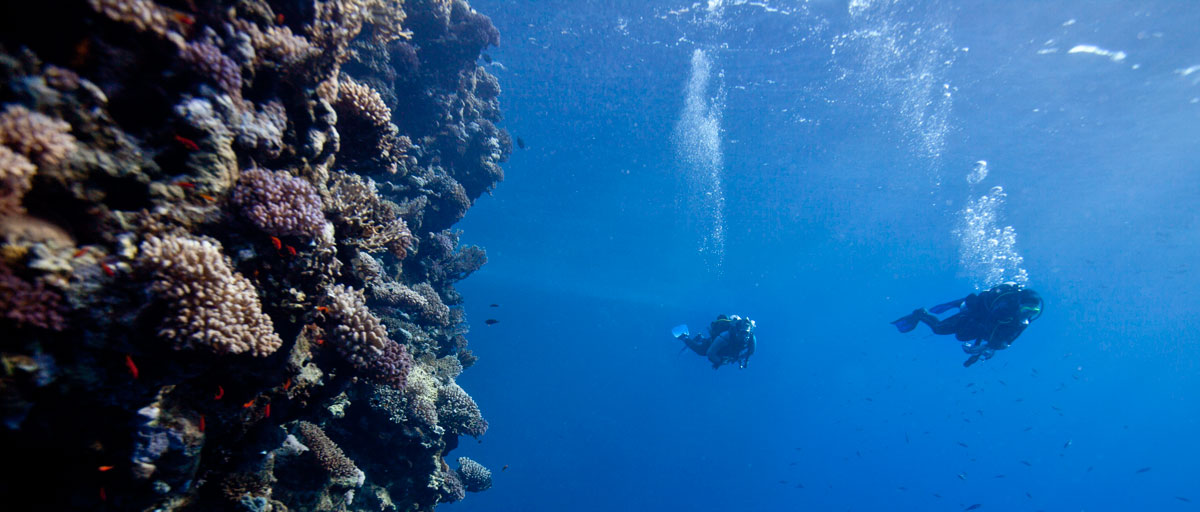
In a study recently published in Frontiers in Ecology and the Environment the authors argue that shocks caused by climate and seasonal change could be used to aid recovery of some of the world's badly-degraded coral reefs. Photo: B. Christensen/Azote
Coral reef recovery
Back from the brink
Shocks and natural variability can help restore coral cover on degraded reefs
- Study argues that climate and seasonal change could be used to help restore degraded coral reefs
- Storms, cloudy weather or seasonal changes could be used by managers as a window of opportunity to bring degraded, seaweed dominated reefs back to a healthy state
- While small patches of reefs are often protected, larger areas are needed for corals to flourish – utilising shocks could help do this
The world's coral reefs are in a bad state, but help might come from an unlikely source.
In a study recently published in Frontiers in Ecology and the Environment, centre researchers Magnus Nyström and Albert Norström together with researchers from Australia, argue that shocks caused by climate and seasonal change could be used to aid recovery of some of the world's badly-degraded coral reefs.
New management approach
With 70 percent or more of the world’s coral reefs now assessed as degraded, adopting a business-as-usual approach to how we use and manage reefs is no longer an option, says lead author of the report Nick Graham.
"We are unlikely to be able to keep many of the world’s reefs in a pristine state, but with good management we may be able to maintain them in a coral-dominated condition and in some cases we may be able to bring back reefs from a degraded state"
Nick Graham, lead author
The researchers have taken heart from examples on land in desertified landscapes; exceptional falls of rain, in combination with controls on grazing pressure, can result in widespread regrowth of natural vegetation.
Not just the corals suffering
They argue that coral reef managers may be able to take advantage of shocks like tropical storms, periods of cloudy weather or even strong seasonal effects on abundance to restore coral cover on degraded reefs.
"Often we think of these shocks as something bad. And for reefs dominated by corals they usually are. However, they can also be bad for reefs that have become dominated by other, less desirable organisms, such as sea weed. Under these circumstances shocks can be viewed as something positive, an opportunity to break feedbacks that lock reefs in a degraded state," Magnus Nyström explains.
The key to the new thinking is resilience: healthy corals reefs are naturally resilient to shocks – but damaged ones may become overgrown with sea weeds, and the corals vanish.
"Once reefs have become overgrown by sea weed they tend to be quite resilient and difficult to reverse, particularly if degradation has occurred over large areas and has been allowed to persist for a long time," Nyström explains.
"Storms can severely damage corals reefs, but they may be even more devastating to sea weed. This opens up a window of opportunity for coral settlement on grounds that previously were occupied by the sea weed."
"Similarly cloudy weather and seasonal changes in water temperature can cause the weeds to die back," Nyström continues.
Stay away
The key to bringing back corals is exactly the same as preventing coral cover being lost in the first place, Albert Norström says – reducing human impacts through regulation of fisheries and water quality. If reefs are prepared in this way, they may bounce back when a window for recovery opens.
The researchers emphasize that both protection and recovery of the world’s coral reefs call for a fundamental change in how people interact with and use reef ecosystems.
"Traditionally there has been much focus on conserving small parts of a reef in marine protected areas. However, in order to successfully protect coral reefs at larger scales, and reverse those that are already degraded we need a much broader approach. Such an approach will require linking ecosystem and societal dynamics where coral reefs are treated as social-ecological systems," Norström explains.
The paper concludes "Although the composition of coral reefs will likely continue to vary over time, it may be possible to maintain coral-dominated reefs and their associated ecosystem goods and services…Scientists and managers could take advantage of opportunities for change by harnessing shocks and natural variability as potential stimuli for beneficial shifts in ecosystem states."
Related info
Graham, N. A.J, Bellwood D. R., Cinner J. E., Hughes T. P., Norström A. V., and Nyström M. 2013. Managing resilience to reverse phase shifts in coral reefs. Front Ecol Environ 2013; doi:10.1890/120305
Phone: +468 16 2000
Organisation number: 202100-3062
VAT No: SE202100306201






